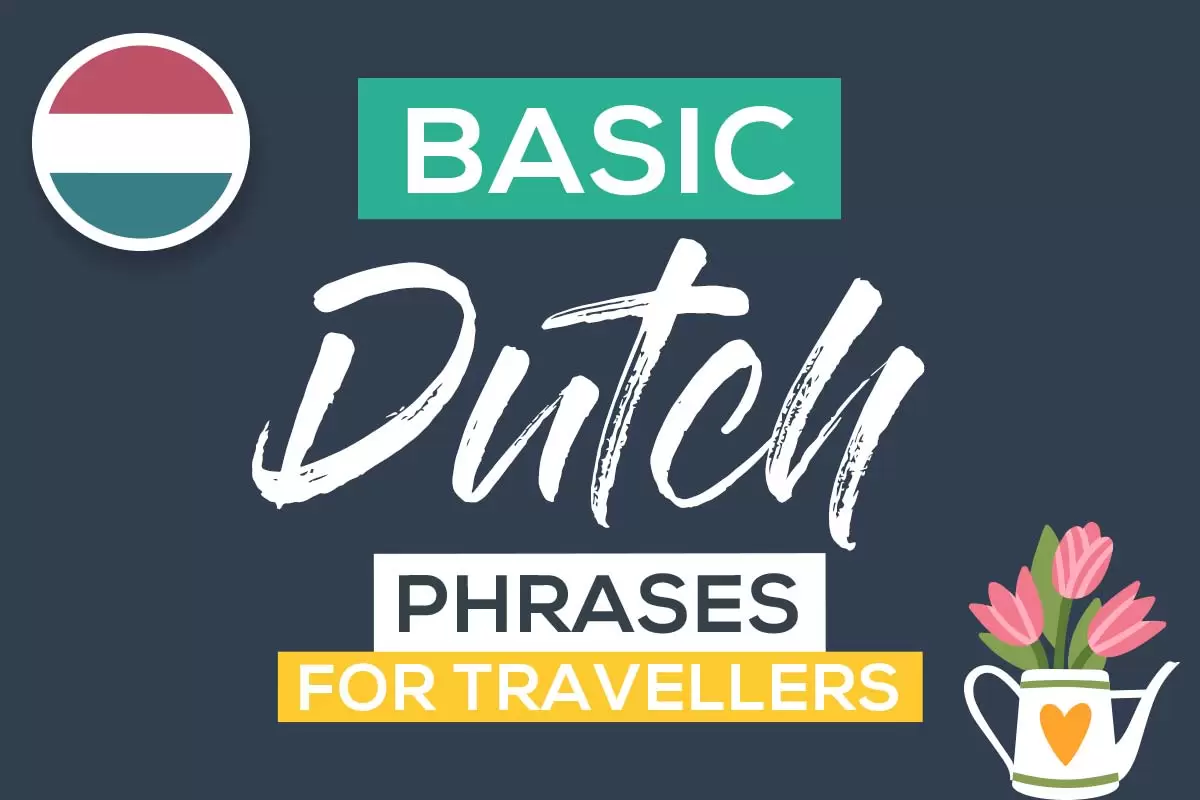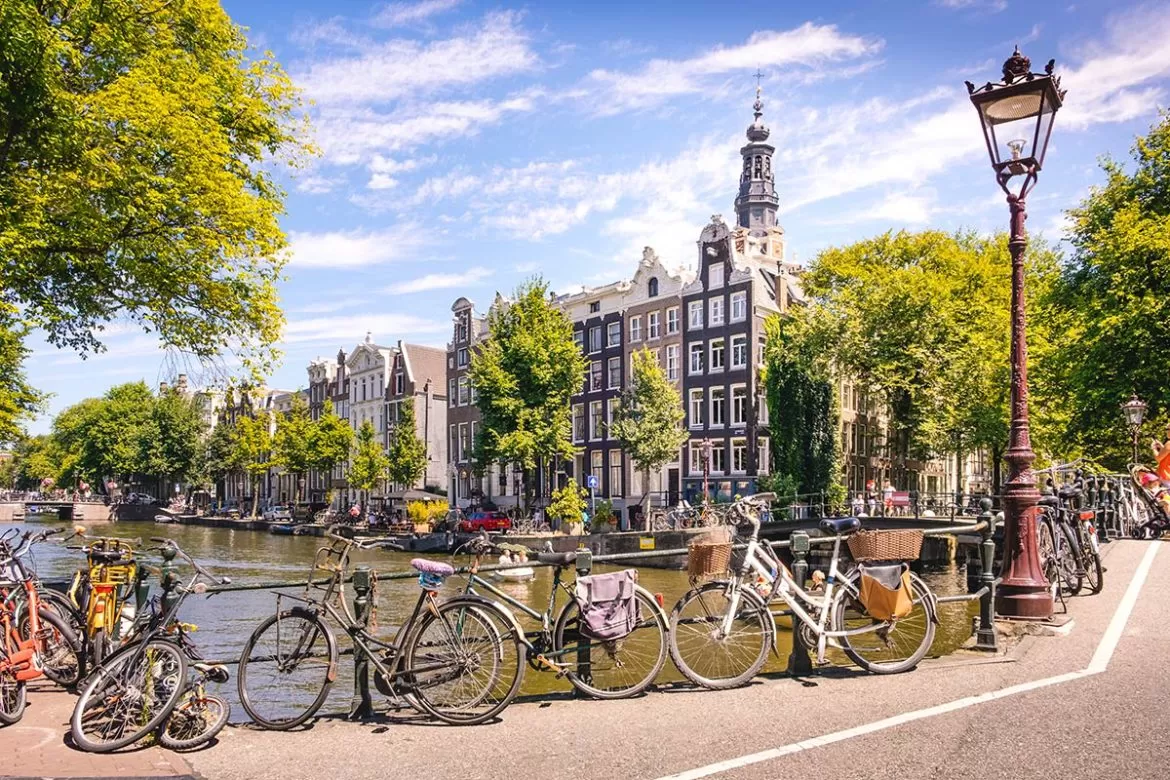Preparing for your trip to the Netherlands? Don’t forget to pack this list of basic Dutch words. Here are 70 useful Dutch phrases that every traveller needs!
The best part about learning Dutch, officially called Nederlands (ney-duhr-lands) is that it’s very similar to English. Over 2000 English words are of Dutch origin including ship, dock, buoy and yacht. Thanks to these similarities and borrowings, the Dutch language won’t sound entirely foreign to you. Take the phrases ‘My name is…’, which in Dutch it ‘Mijn naam is…”. With just a slight tweak to the pronunciation, you can learn and use this phrase without much effort. Still not convinced? Take a wild guess what ‘mijn hand is warm’ means.
While the Dutch speak impeccable English and enjoy practising it with visitors, remember that conversing in the local language is always appreciated and is seen as a sign of good will and will give you greater insight into the culture.
To help me create this new addition to my growing collection of free travel phrase guides, I asked my friend and native Dutch speaker Nienke from The Travel Tester to provide accurate Dutch translations and pronunciation tips.
Want to have fun whilst learning Dutch? Struggling to find decent Dutch language resources? I recommend getting uTalk. Available as a desktop site and app, uTalk is awesome for learning key words and phrases in Dutch, especially if you want to use it for travel purposes. It’s great for beginners getting started in a language and invaluable for intermediates looking to fill in gaps in their vocabulary and pronunciation.
What I love most about uTalk is that you can jump around their extensive library of topics and choose what you want to learn, when you want, and at your own pace. Because I believe in uTalk so much, I reached out to them and we’ve teamed up to offer you an exclusive 30% OFF reader discount across all of uTalk’s 140 languages! This offer isn’t available anywhere else! Click here to claim your exclusive 30% discount.
Let’s take a closer look at the Dutch language. Here’s what we’ll cover:
Table of Contents
- How many people speak Dutch?
- Where is Dutch spoken?
- Is Afrikaans and Dutch the same?
- Dutch Pronunciation
- Dutch Alphabet
- Dutch Travel Phrases
- Useful Dutch Phrases for Travellers [Infographic]
- 10 Hilarious Dutch Expressions
How many people speak Dutch?
There are approximately 23 million people worldwide who speak Dutch as their native language with 16 million of those living in the Netherlands. An additional 5 million people speak Dutch as their second language.
Where is Dutch spoken?
Dutch is the official language of the Netherlands. Thanks to the explorers and traders of the Dutch Golden Age during the 17th century, Dutch is also spoken in various locations around the world.
Dutch, or Flemish Dutch, is one of Belgium’s three official languages including French and English. Flemish-Dutch is predominantly spoken in the northern provinces of Belgium known as Flanders. This accounts for about 60% of Belgium’s population who speak Dutch as their native language.
Having some knowledge of Dutch will also come in handy when travelling beyond European borders to places such as Suriname (South America), Aruba and the Dutch Antilles (Caribbean) where Dutch has national language status.
Is Afrikaans and Dutch the same?
Short answer is no, but they’re very similar. Let me explain. When the Dutch East India Company decided to establish a station at the Cape of Good Hope in South Africa, this saw the start of a new language, Afrikaans.
Afrikaans is one of South Africa’s 11 official languages. Afrikaans derived from a colonial dialect of Dutch (“Cape Dutch”) spoken by 17th-century emigrants from the Holland and Zeeland regions in the Netherlands. Afrikaans is considered a language, not a dialect of Dutch.
Standard Afrikaans is lexically extremely close to Dutch with around 90 to 95 per cent of its vocabulary being of Dutch origin. The main difference between the two languages is that Afrikaans has a must simpler grammar. For example, there is no grammatical gender or number markings on verbs. Afrikaans also uses a double-negation, a typical trait of the French language.
As the settlers moved inland so too did their language which was influenced and altered by other settlers and local languages. Afrikaans is spoken more in Namibia than English is even though English is the country’s official language.
In both Belgium and the Netherlands, the native official name for Dutch is Nederlands.
I wrote a separate post on this topic of what language is spoken in Belgium after my first trip there.
Dutch Pronunciation
Once you familiarise yourself with the Dutch alphabet (which isn’t too dissimilar to English) you’ll be able to say most words and be understood fairly easily.
The main characteristics of Dutch are its use of a guttural r and kh sounds and its impressive variety of vowel sounds with long and short versions. While it can be awkward to pronounce the guttural sounds, just remember that your effort will be appreciated.
Dutch Alphabet
Below is the Dutch alphabet and pronunciation guide.
The only letter that deserves a special mention is Y since there are different ways of pronouncing it, just like in English.
Firstly, the letter itself is called ‘Griekse-ij’ (‘greek-ay’), ‘i-grec’ (‘ee-khrec’) or ‘ypsilon’ (‘ipsilon’). Secondly, when on its own, the letter Y is usually pronounced ‘ay’ – like when we say the alphabet > ‘xyz’ ‘iks, ay, set’.
Lastly, the letter Y can either be a vowel or a consonant depending on the placement in a word. For example, in words like ‘symbool’ (symbol) or baby (baby), it’s a vowel and you say ‘ee’ (just like in English). However, Y in ‘yoghurt’ is a consonant and you pronounce it ‘j’ (just like you say ‘yoghurt’ in English.
| a (aa) | j (yey) | s (es) |
| b (bey) | k (kaa) | t (tey) |
| c (sey) | l (el) | u (ew) |
| d (dey) | m (em) | v (vey) |
| e (ey) | n (en) | w (wey) |
| f (ef) | o (oh) | x (iks) |
| g (khey) gutteral | p (pey) | y (ay) |
| h (haa) | q (kew) | z (set) |
| i (ee) | r (er) trilled |
P.S. If you’re reading this on your phone and can’t see the pronunciation column, turn it to landscape mode. For some reason, tables aren’t mobile friendly. Sorry!
Dutch Phrases & Useful Travel Phrases

Want the infographic to take with you? Scroll to the bottom of the page.
I hope you enjoyed this Dutch travel phrase guide as much as I enjoyed bringing it together. If you have any requests for other languages, let me know in the comments section! In the meantime, check out the rest of my collection of free travel phrase guides.
Useful Dutch Phrases for Travellers [Infographic]
Like it? Pin it for later!

Hilarious Dutch Expressions
Visiting the Netherlands? Check out my Netherlands city guides
- 21 Things to do in Rotterdam You Probably Didn’t Know About
- Perfect Day Trip to Leiden: Everything You Need to Know
- Ultimate Den Hague Itinerary: 17 Things You Must Do in The Hague
Visiting Belgium? Check out my Belgium city guides
- Ultimate Brussels Itinerary – How to Spend 2 Days in Brussels
- Ghent Day Trip Itinerary: Top 10 Things to See in Ghent in One Day
- Belgium’s Cutest City: 10 Wonderful Things to Do in Bruges
Want to know more about learning languages? Start here!
- Language learning tips: 11 Polyglots Reveal The Secrets of Their Success
- Top Language Learning Resources You Should Use
- 11 Life-Changing Reasons Why You Should Learn a Language
- 42 beautiful Inspirational Quotes for Language Learners
- Top 10 Best Ways to Learn a Language Better and Faster
Over to you!
Which of these Dutch phrases did you find the most useful? Are you planning a trip to the Netherlands or have already been? Let me know using the comments section below or join me on social media to start a conversation.
Thanks for reading and I hope you enjoyed this post.
Like what you see? Subscribe using the form below to have all of my posts delivered directly to your email.


2 comments
I spent a month with a family in the Netherlands a while back. It’s amazing how dutch kind of seeps in for English speakers! I learned the phrase “wil je water drinken?” (do you want to drink water?) almost by accident!
That said, I never managed to pronounce the Dutch trilled R from the back of the throat…
I know exactly how you feel. Hearing Dutch as an English speaker feels like you SHOULD be able to understand it without having even studied it. It just sounds so similar to English yet certain sounds stump the ears :P